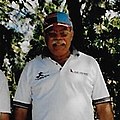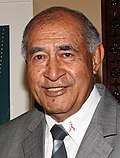Laisenia Qarase | |
|---|---|
 Qarase in 2004 | |
| Prime Minister of Fiji | |
| In office 16 March 2001 – 5 December 2006 | |
| President | Josefa Iloilo |
| Deputy | Tupeni Baba Epeli Nailatikau Teimumu Kepa |
| Preceded by | Tevita Momoedonu |
| Succeeded by | Jona Senilagakali |
| In office 4 July 2000 – 14 March 2001 | |
| President | Ratu Josefa Iloilovatu Uluivuda |
| Deputy | Epeli Nailatikau |
| Preceded by | Vacant |
| Succeeded by | Tevita Momoedonu |
| Member for Lau | |
| In office 2001–2006 | |
| Preceded by | Koila Nailatikau |
| Succeeded by | Office abolished |
| Personal details | |
| Born | 4 February 1941 Vanua Balavu, Colony of Fiji |
| Died | 21 April 2020 (aged 79) Suva, Fiji |
| Political party | Soqosoqo Duavata ni Lewenivanua |
| Spouse | Leba Qarase (?–2020; his death) |
| Children | 5 |
Laisenia Qarase (pronounced [lai̯seni̯a ŋɡaˈrase]; 4 February 1941 – 21 April 2020)[1] was a Fijian politician. He served as the sixth Prime Minister of Fiji from 2000 to 2006. After the military quashed the coup that led to the removal of Mahendra Chaudhry, Qarase joined the Interim Military Government as a financial adviser on 9 June 2000, until his appointment as Prime Minister on 4 July. He won two parliamentary elections, but a military coup removed him from power on 5 December 2006. He was later imprisoned on corruption charges brought by the military-backed regime.
A native of Vanua Balavu Island in the Lau archipelago, he was one of many Lauans to have held top leadership positions in Fiji.
Early and personal life
[edit]Qarase was born in 1941 into the Tota clan in Mavana on Vanua Balavu, the son of Josateki Mate of Mavana village. After attending local schools, he enrolled at Suva Boys Grammar School. Following his education at Suva Boys Grammar School, Qarase left Fiji in 1959 and went on to graduate from New Zealand's University of Auckland with a degree in Commerce. He got his first job at the Fijian Affairs Board and served as a career civil servant at the ministries of Finance, Commerce and Industry and Public Service. He entered the banking profession and became the first ethnic Fijian managing director of the publicly owned Fiji Development Bank (FDB) in 1983, a position he held for fifteen years. After the 1987 coup, he was called in by the new government to help to rebuild the damaged economy. He introduced the nine-point plan which oversaw extended government assistance to Fijians and the creation of Fijian Holdings. However, the plan mostly resulted in bankruptcies and he was embroiled in a scandal in Fijian Holdings over the acquisition of shares by his family. In 1994, he became the chairman of Fiji Television and clashed with the government for not consulting him over its plans to introduce US investment into the company.[2]
Qarase had Indigenous Fijian, Tongan, and Jewish ancestry.[3] Qarase's mother is the daughter of John Herman Ma’afu Bowman, who had Jewish parents, Alexander Bowman and Sara Annette.[4][5] He was married to Leba Qarase, with whom he had five children. Qarase was a chief in his native village of Mavana, on the island of Vanua Balavu, where he held the traditional chiefly title of Tui Kobuco.[6]
2006 coup and aftermath
[edit]On the occasion of his 65th birthday on 4 February 2006, Qarase stated that if re-elected in the election that was duly held on 6–13 May, it would very likely be his last term in office. He won re-election, but continuing disagreements between his government and the powerful Republic of Fiji Military Forces culminated in a military coup on 5 December. Fiji Village reported the next day that he had been flown to his home island of Vanuabalavu by the military, while Radio New Zealand claimed that he had fled there. He told Radio New Zealand that he was "down but not out"; he intended to fight on, and called for a peaceful popular uprising. On the same day it was reported that he had asked for military assistance from Australia. The BBC reported that after being warned by Commodore Bainimarama not to "incite violence", Prime Minister Qarase planned to return to Suva, from which he was banished, but was warned that he faced arrest if he returned.[7]
From Vanuabalavu, he remained outspoken in condemning the military takeover, comparing the new regime to those of Saddam Hussein, Adolf Hitler, and Idi Amin,[8] in an interview quoted in the Fiji Times and Fiji Village on 13 and 14 December 2006.
On 2 February, Fiji Village quoted Qarase as having told Radio Australia that he was considering contesting the election to restore democracy, expected to be held within the next five years. Qarase called for the date to be brought forward.[9]
On 6 September 2007, Bainimarama imposed a renewed state of emergency for one month, alleging that Qarase and his spokesman, Peceli Kinivuwai, were spreading lies and attempting to cause destabilization, following Qarase's return to Suva after having been confined to Vanuabalavu since his ousting.[10] Bainimarama said that Qarase and his spokesman should return to Vanuabalavu and that they could "talk from there."[11]
Qarase initiated a court challenge to the coup on 4 October 2007.[12] Martial law was lifted on 6 October[13] on the grounds that there was no threat.[14]
Elections were tentatively set in February 2009 but did not occur until September 2014. Qarase was one of several politicians banned from running for office and his political party was forced to disband. It reorganised, but was forced to take a name in English, not Fijian (Social Democratic Liberal Party). It was later forced to change its initials to not match Qarase's former party, although its policy positions remained similar.
Financing allegations
[edit]In January 2010, it was reported that Qarase would stand trial on charges, brought by the Military-backed interim government, of abusing his office. Qarase was found guilty of abusing his office and failing to perform his duty, and sentenced on 3 August 2012 to one year in prison. His supporters say the charges were politically motivated.[15]
Cabinet
[edit]| Ministers | |||
|---|---|---|---|
| Portfolio | Portrait | Minister | Constituency |
|

|
Laisenia Qarase | Lau |

|
Epeli Nailatikau | None (Great Council of Chiefs) | |
|
Alipate Qetaki | None | |
|
Jone Kubuabola | South West Urban | |
|

|
Kaliopate Tavola | Lami |
|
Tomasi Vuetilovoni | Ra | |
|
Jone Koroitamana | None | |
|
Hector Hatch | None | |
|

|
Inoke Kubuabola | None (Senate) |
|
Tevita Momoedonu | Vuda | |
|
Talemo Ratakele | None (Senate) | |
|

|
Teimumu Kepa | Rewa |
|
Nelson Delailomaloma | None | |
|
Joketani Cokanasiga | Serua | |
|
Keni Dakuidreketi | None | |
|
Pita Nacuva | Nadroga Navosa | |
|
Tu'uakitau Cokanauto | Tailevu | |
|
Apisai Tora | None | |
|
Inoke Takiveikata | None (Senate) | |
|
Mitieli Bulanauca | Bua | |
| Assistant Ministers | |||
|---|---|---|---|
| Portfolio | Portrait | Minister | Constituency |
|

|
Suliano Matanitobua | Namosi |
|
Finau Tabakaucoro | None | |
|
Senimili Dyer | Tailevu South Lomaiviti | |
|

|
Bernadette Ganilau | None |
|
Marieta Rigamoto | Rotuma | |
|
Semi Seruvakula | None | |
|

|
Kolinio Rokotuinaceva | None (Great Council of Chiefs) |
|
George Shiu Raj | None | |
Sources
[edit]External links
[edit]- "Ousted Fiji leader talks about life after the coup", AAP, 5 August 2008
References
[edit]- ^ "Laisenia Qarase, former Fiji PM bookended by coups, dies at 79". RNZ. 21 April 2020. Archived from the original on 22 April 2020. Retrieved 21 April 2020.
- ^ Profiles of People in Power: The World's Government Leaders. Routledge. 3 June 2014. p. 172. ISBN 9781317639404. Archived from the original on 21 February 2021. Retrieved 9 March 2020.
- ^ Vuataki, K. (22 April 2013). Chapter 32. WestBow Press. p. 272. ISBN 9781449789961. Archived from the original on 21 February 2021. Retrieved 4 August 2015.
He was from Vanua Balavu in northern Lau and had native Fijian, Tongan, and Jewish ancestry.
- ^ "John Abrahams". fijilandofourfathers.com. Retrieved 9 July 2022.
- ^ "Former PM Qarase's final wish". FijiTimes. 2 May 2020. Retrieved 9 July 2022.
- ^ "Qarase is Tui Kobuco in Mavana Village". Fijian Culture and Custom. fijidailypost.com. 3 January 2009. Retrieved 22 August 2015.
- ^ "Clark concerned about Qarase's plans". Fijilive. 12 December 2006. Archived from the original on 3 January 2007. Retrieved 13 November 2008.
- ^ "Fiji is slipping into dictatorship: Qarase". Fiji Times Online. 14 December 2006. Archived from the original on 23 February 2012.
- ^ "Qarase May Consider Return to Power if Elections Held Early". fijivillage.com. 2 February 2007. Archived from the original on 2 February 2007.
- ^ "Emergency rule declared in Fiji". BBC News. 7 September 2007. Archived from the original on 8 October 2019. Retrieved 12 May 2019.
- ^ "Martial law declared in Fiji – again". The New Zealand Herald. NZPA / AAP. 6 September 2007. Archived from the original on 29 September 2007. Retrieved 13 October 2011.
- ^ "Ousted Fiji prime minister begins court challenge to legality of 2006 military coup", Associated Press (International Herald Tribune), 4 October 2007.
- ^ "Martial law lifted in Fiji". Television New Zealand. 6 October 2007. Archived from the original on 16 May 2011. Retrieved 13 October 2011.
- ^ "Fiji's military government to lift state of emergency after no 'threat to nation' found", Associated Press (International Herald Tribune), 5 October 2007.
- ^ "Fiji's former prime minister Laisenia Qarase jailed over corruption". The Guardian. London: GMG. 3 August 2012. ISSN 0261-3077. OCLC 60623878. Archived from the original on 6 January 2016. Retrieved 7 November 2012.